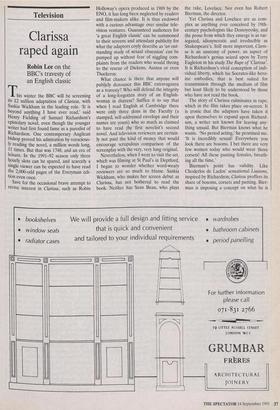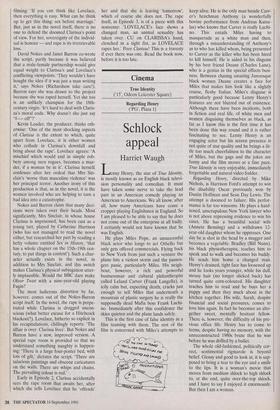Television
Clarissa raped again
Robin Lee on the BBC's travesty of an English classic his winter the BBC will be screening its £2 million adaptation of Clarissa, with Saskia Wickham in the leading role. 'It is beyond anything I have ever read,' said Henry Fielding of Samuel Richardson's epistolary novel, even though the younger writer had first found fame as a parodist of Richardson. One contemporary Anglican bishop proved his admiration by voracious- ly reading the novel, a million words long, 11 times. But that was 1748, and an era of leisure. In the 1991-92 season only three hourly slots can be spared, and scarcely a single viewer can be expected to have read the 2,000-odd pages of the Everyman edi- tion even once.
Save for the occasional brave attempt to revive interest in Clarissa, such as Robin
Holloway's opera produced in 1989 by the ENO, it has long been neglected by readers and film-makers alike. It is thus endowed with a curious advantage over similar tele- vision ventures. Guaranteed audiences for `a great English classic' can be summoned to their screens and attendant publicity for what the adaptors coyly describe as 'an out- standing study of sexual obsession' can be pumped up without fear of niggling com- plaints from the readers who would throng to the rescue of Dickens, Austen or even Thackeray.
What chance is there that anyone will publicly denounce this BBC extravaganza as a travesty? Who will defend the integrity of a long-forgotten story of an English- woman in distress? Suffice it to say that when I read English at Cambridge there were only three dons in the Faculty (a stamped, self-addressed envelope and their names are yours) who so much as claimed to have read the first novelist's second novel. And television reviewers are certain- ly not paid the kind of money that would encourage scrupulous comparison of the screenplay with the very, very long original.
Nevertheless, when I went to visit the set, which was filming at St Paul's in Deptford, I began to wonder whether word-weary reviewers are so much to blame. Saskia Wickham, who makes her screen debut as Clarissa, has not bothered to read the book. Neither has Sean Bean, who plays the rake, Lovelace. Nor even has Robert Bierman, the director.
Yet Clarissa and Lovelace are as com- plex as anything ever conceived by 19th- century psychologists like Dostoyevsky, and the prose from which they emerge is as var- iegated, idiosyncratic and irreducible as Shakespeare's. Still more important, Claris- sa is an anatomy of power, an aspect of Richardson's genius seized upon by Terry Eagleton in his study The Rape of 'Clarissa'. It is Richardson's vivid conception of indi- vidual liberty, which his Socrates-like hero- ine embodies, that is best suited for transmission through the medium of film but least likely to be understood by those who have not read the book.
The story of Clarissa culminates in rape, which in the film takes place on-screen. It is ironic that the adaptors have taken it upon themselves to expand upon Richard- son, a writer not known for leaving any- thing unsaid. But Bierman knows what he wants. 'No period acting,' he promised me. `It is incredibly sexual! Everywhere you look there are bosoms. 1 bet there are very few women today who would wear those corsets! All these panting females, breath- ing all the time.'
Bierman's point has validity. Like Choderlos de Laclos' sensational Liaisons, inspired by Richardson, Clarissa proffers its share of bosoms, corsets and panting. Bier- man is imposing a concept on what he is
filming: 'If you can think like Lovelace, then everything is easy. What can he think up to get this thing: sex before marriage.' But, just as in the novel itself, there is no one to defend the doomed Clarissa's point of view. For her, sovereignty of the individ- ual is honour — and rape is its irretrievable loss.
David Nokes and Janet Barron co-wrote the script, partly because it was believed that a male-female partnership would give equal weight to Clarissa's and Lovelace's conflicting viewpoints. 'They wouldn't have bought the idea if it was just a man writing it,' says Nokes (Richardson take care!). Barron says she was drawn to the project because she was raped herself. Yet she too is an unlikely champion for the 18th- century virgin: 'It's hard to deal with Claris- sa's moral code. Why doesn't she just say "f— off'?'
Kevin Loader, the producer, thinks oth- erwise: 'One of the most shocking aspects of Clarissa is the extent to which, quite apart from Lovelace, it is other women who collude in Clarissa's downfall and bring about the rape'. Lovelace agrees: 'A mischief which would end in simple rob- bery among men rogues, becomes a mur- der, if a woman be in it'. Clarissa herself confesses after her ordeal that Mrs Sin- clair's 'worse than masculine violence' was her principal terror. Another irony of this production is that, as in the novel, it is the women involved who are helping to turn a bad idea into a catastrophe.
Nokes and Barron claim that many deci- sions were taken over their heads. Most significantly, Mrs Sinclair, in whose house Clarissa is imprisoned, has been cast as a young tart, played by Catherine Harrison (who has not managed to read the novel either, but researched her part by reading a hefty volume entitled Sex in History, 'that has a whole chapter on the 15th-19th cen- tury, to put things in context'). Such a char- acter actually exists in the novel, in addition to Mrs Sinclair, and this switch makes Clarissa's physical subjugation utter- ly implausible. Would the BBC dare make Oliver Twist with a nine-year-old playing Fagin?
The most ludicrous distortion by far, however, comes out of the Nokes-Barron script itself. In the novel, the rape is perpe- trated while Clarissa is drugged uncon- scious (what better excuse for a Hitchcock blackout?). Lovelace, hitherto so explicit in his recapitulations, chillingly reports: 'The affair is over. Clarissa lives'. But Nokes and Barron have a new, improved version. A special rape room is provided so that we understand something naughty is happen- ing: 'There is a large four-poster bed, with lots of gilt,' dictates the script. 'There are salacious paintings and obscene caricatures on the walls. There are whips and chains. The prevailing colour is red.'
Early in Episode 2, Clarissa accidentally sees the rape room that awaits her, after which she tells Lovelace that he 'offends' her and that she is leaving 'tomorrow', which of course she does not. The rape itself, in Episode 3, is of a piece with this nonsense: `LOVELACE's face shows a changed man, an animal sexuality has taken over. CU on CLARISSA's hand, clenched in a tight fist, as LOVELACE rapes her.' Poor Clarissa! This is a travesty if ever there was one. Read the book now, before it is too late.



















































 Previous page
Previous page